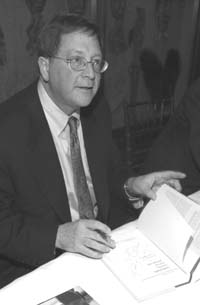David Kirp Discusses the Marketing of Higher Education at TC Booktalk
David L. Kirp has turned out books on subjects as varied as AIDS, affordable housing, gay rights and charter schools. Kirp, a professor of public policy at the University of California at Berkeley, has now turned his attention to a force he has observed firsthand in his three decades in academia: the marketing of higher education.
Kirp spoke about his latest book, Shakespeare, Einstein, and the Bottom Line, at the American Museum of Natural History's Linder Theater. The discussion was moderated by Richard Heffner, host of Channel 13's "Open Mind."
"There have been times in our history when we've been market-obsessed," Kirp said. "This is one of them." That obsession manifests itself in higher education by treating students as consumers to be lured to elite universities and placated with good grades and plush accommodations, he said. It can mean greater reliance on non-tenured and poorly paid adjuncts, or, conversely, by entering an arms race for famous professors, offering them huge salaries and lighter teaching loads. Sometimes it means, as in the case of his own campus, selling university research to the highest bidder. (At Berkeley in 1998, that bidder was Novartis, the Swiss pharmaceutical giant.)
But Kirp wants to offer a nuanced view, he told his audience. The situation is more complicated than the trope of a "purist institution besieged by bankers… If you don't pay attention to the bottom line, you don't live to see another day."
Kirp said he embarked on a "Gulliver's travels" in the course of writing the book, which includes more than a dozen case studies, including Columbia University, to illustrate his themes. At the University of Chicago, he encountered the purist vision, embodied by senior faculty who decried-in the starkest terms-the cash-strapped institution's plans to cut back the required core curriculum and increase the number of undergraduates. Too often this insistence on purism "is self-interest dressed up in fancy garb," he said. "It means freedom for academics to do whatever they want to do."
At the other extreme were the universities that turned departments into "revenue centers," students into customers, professors into entrepreneurs and institutions into profit-seekers. The losers at these institutions included the traditional liberal arts, along with low-income students who were disadvantaged by the increasing proportion of scholarships awarded for merit, not need.
What is Kirp's ideal? There is merit in the classic notion that the academy defends values that don't have short-term benefit, he said: "If your hand is out to power, it's hard to speak truth to power." And while an institution should know what it is and what it stands for, it must also look after the bottom line to survive and thrive.
Kirp writes approvingly of an "open research" consortium at UC Berkeley to develop a powerful silicon chip. "The consortium brought dollars to research ideas, while the university brought ideas and enthusiasm." The result was that knowledge was expanded far more than it would have been otherwise, he said.
Finding the balance between commerce and idealism can be difficult, Kirp acknowledges, but he hopes his book will play a role.
"I want to help kick-start a conversation among people who have to decide where to stand on these issues," he said.
Published Friday, Jan. 14, 2005
